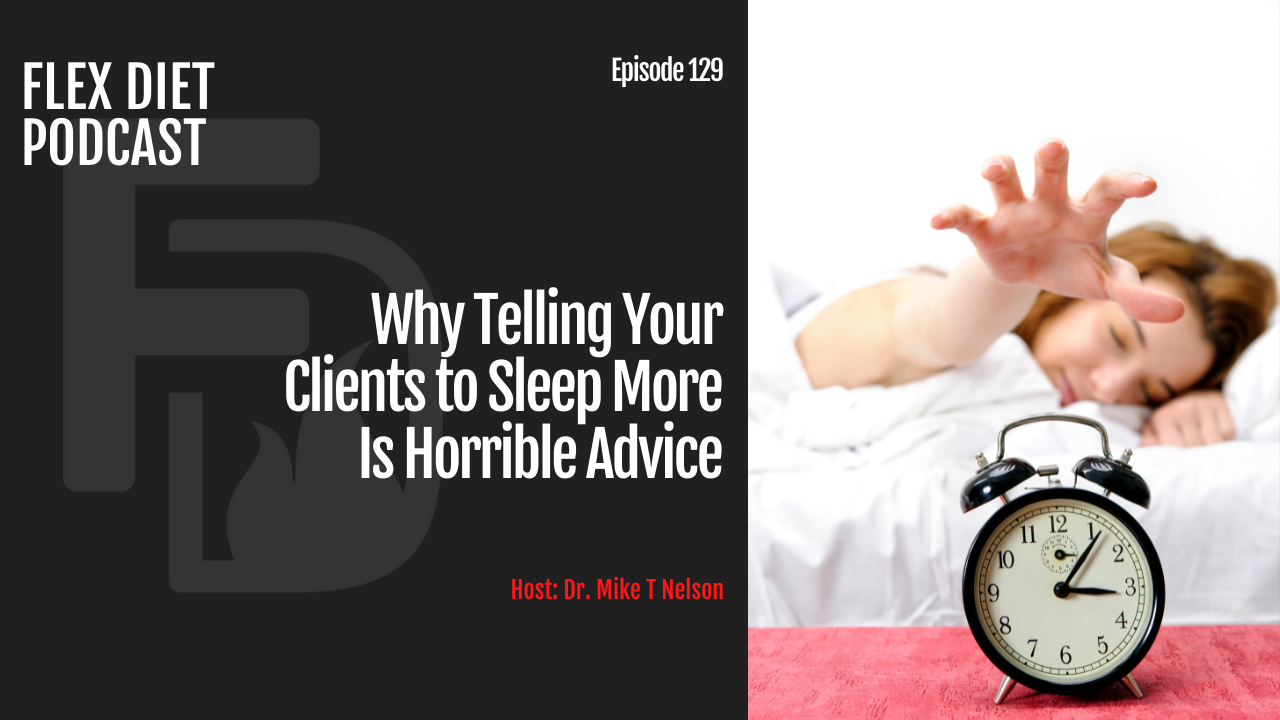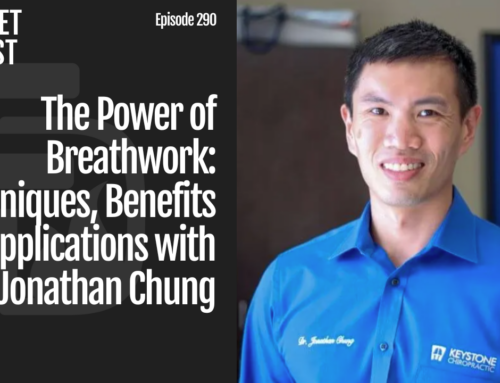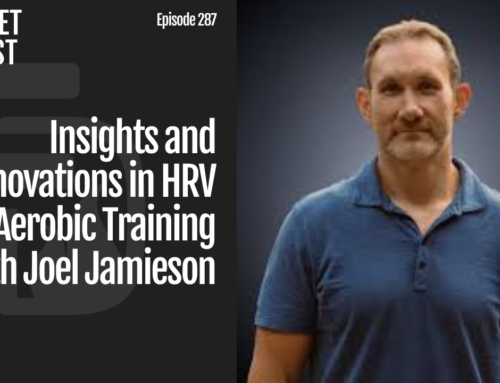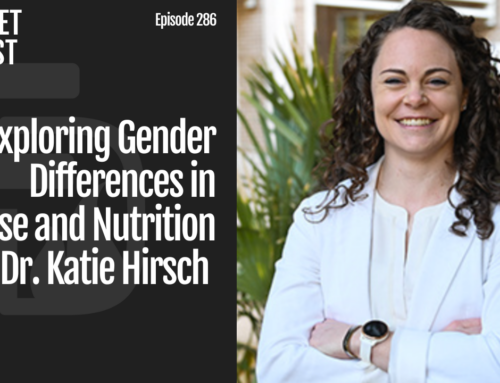Today, I’m talking about why if you’re a trainer or a coach, telling your clients to sleep more is horrible advice. I know what you’re thinking, but here’s better advice you can give.
Episode Notes
-
What does the client need to give up?
- Physiological reasons don’t address psychological
- Hardest to change
- Coaching leverage and how to calculate it
- More about the Flex Diet Certification
The Flex Diet Podcast is brought to you by the Flex Diet Certification. Go to the Flex Diet website for 8 interventions on nutrition and recovery. The course will open again in January 2020.Rock on!

Dr. Mike T Nelson

Dr. Mike T Nelson
PhD, MSME, CISSN, CSCS Carrick Institute Adjunct Professor Dr. Mike T. Nelson has spent 18 years of his life learning how the human body works, specifically focusing on how to properly condition it to burn fat and become stronger, more flexible, and healthier. He’s has a PhD in Exercise Physiology, a BA in Natural Science, and an MS in Biomechanics. He’s an adjunct professor and a member of the American College of Sports Medicine. He’s been called in to share his techniques with top government agencies. The techniques he’s developed and the results Mike gets for his clients have been featured in international magazines, in scientific publications, and on websites across the globe.
- PhD in Exercise Physiology
- BA in Natural Science
- MS in Biomechanics
- Adjunct Professor in Human
- Performance for Carrick Institute for Functional Neurology
- Adjunct Professor and Member of American College of Sports Medicine
- Instructor at Broadview University
- Professional Nutritional
- Member of the American Society for Nutrition
- Professional Sports Nutrition
- Member of the International Society for Sports Nutrition
- Professional NSCA Member
Welcome back to the flex diet podcast. I’m your host, Dr. Mike T. Nelson, we talk about all things to increase muscle mass increase performance, better body composition, all with a flexible approach and without destroying your health in the process. Today, it’s brought to you again by flex diet certification, which will open on January 3 2022.
Hard to believe that it’s 2022 already, to get all the information, go to flex diet.com. And if you’re listening to this, before that date, it will be open for one week, January 3 through January 10. But before that, and you can still get on to the newsletter. And I’ll have some exclusive bonuses just for the newsletter, people go to flex diet.com. Go hit join the waitlist, and you’ll be the first to be notified on it. The special fast acting bonuses, everything else. So go to flex diet.com. It’s open to January 22, the third through the 10th. So January 2020, to the third through the 10th.
And today I’m talking about why if you’re a trainer or a coach, telling your clients to sleep more, is horrible advice. Now I know what you’re thinking that this may go against the popular realm of sleep right now. And they’re great people who put out good information about sleep. And it is true from a physiologic standpoint, that if I could wave a magic wand over clients, and get them to sleep more, that pretty much everything would improve their health markers would improve their body composition would improve their performance would improve. And it also doesn’t directly cost them a dime.
So it is very inexpensive. So purely from a physiologic standpoint, getting more sleep is beneficial. Now, you could argue that, well, maybe we should focus on sleep quality first, instead of telling people just to sleep more. And I would agree with that. Simple things we’ve talked about on this podcast before. I’ve talked a little bit about sleep on the readyState podcast I did with Dr. Kelly stret, his wonderful wife, Juliet. So you can check out that podcast which will be linked in here too. But at some point, even if you’re sleeping only four hours a night, no matter how high quality of sleep, that is, you’re going to need to sleep more. So doing all the things that increase sleep quality is great.
Making sure your room is nice and dark, making sure it’s cooler, going to bed around the same time getting up around the same time getting sunlight exposure as soon as you can in the morning. Well, this is something I talked about back in like 2015 and included it in the flex diet certification under the sleep intervention. Dr. Andrew Huberman has talked a lot about that too, which is great.
My buddy, Dr. Dan party is where I originally got some of that awesome information from. So when you get sleep into the back of the eye, those little photons trigger the brain to help anchor your circadian rhythm. So you’re more awake during the day, and sleepy at night. So all those things work. Quality and sunlight in the morning are definitely great, big fan of all of those.
However, at some point, you just need to sleep longer. And if you’re a trainer, you can I guarantee relate to this conversation. When you’re looking at a client’s schedule. And they’re coming in sleeping six hours a night, you suggest Hey, Bob, Karen, whoever. I don’t know why we always throw Karen under the bus but I’ll throw Bob under the bus this time.
Oh, okay. You should go to bed two hours early. Looks like you’re going to bed at 11pm You’ve got to get up super early in the morning. You have to take the kids somewhere. You’ve got to get ready. You’ve got a long commute. So you went to bed at 11 You should go to bed at nine that’ll give you an extra two hours of sleep. Which is usually immediately followed by Bob complaining because that’s the only two hours he gets to spend with his wife and relax before he goes to bed.
So now you’re in this kind of value discussion about his lifestyle and Currently, he may not have any more room in his schedule. So already doing your awesome training program, depending on how many hours he has available to train, he has to drive as we mentioned, to work, work hours tend to be longer, or maybe he’s working from home now, he’s got to drive to the gym, get back, if you’ve got kids, or animals, they need attention, hang out with them. And you’re left with these one to two hours at the end of the day to relax kind of for yourself. It’s insane for us to think that any one of those things are going to automatically change overnight.
Yeah, in the long term, I’ve worked with clients who, you know, decided that, for example, one of them busy lifestyle in New York City, wasn’t for them, they ended up moving more towards the Midwest, got a different job and end up working from home. One person in particular sort of working for themselves. So there is changes that can be made. But it’s much more on a long term schedule. So you’re left with arguing with your client about these one or two hours at night. And you’re telling them to go to bed. And he lists all these physiologic reasons why this should happen.
Now, the clients will normally agree with that. But when the rubber hits the meets the road, it’s very difficult for them to do it. So now you’re at this sort of impasse where you’re kind of hounding them or, you know, beat them over the head with technologies such as maybe resting heart rate, or sleep duration, or aura, or whatever. And I like all those things, I think they definitely can be useful, just depends on how they are used. So from physiologic standpoint, there’s all sorts of wonderful reasons why we should get more sleep.
However, from the psychology, or the client’s ability to change, sleep, I find is very, very difficult. So when I was designing the flextight certification, initially, I had everything just based off of the physiologic response, according to the literature in according to experience I’ve had with over two decades of training people, both in person and primarily More recently, the last eight plus years online.
But I soon realized that when I looked at the interventions based on physiology, that sleep came out number one, so I do lots of crazy stuff. When I was designing the flexure diet cert, I would go into a float tank, and think about working with clients. And of course, I tested this out on a few people too. And realize very fast that telling clients to sleep more, in practicality isn’t very good. So my solution is I came up and invented something called coaching leverage, which is the physiologic response times the client’s ability to change or their psychology.
I would then went through all the interventions I had and rated them one through 10. So for the physiology that was more based on the literature, because I wanted to make sure that people were starting with the big rocks, the things that were going to drive change. They didn’t want clients majoring in the minors, right, which was pretty common. And if you’re just left to social media, and all sorts of other media, it’s very easy to be majoring in the minors. And I really feel bad for clients and even some trainers where that happens. Because they’re putting forth the effort to make change. They’re just hyper focused on things that aren’t really going to drive their physiology. However, I soon realized, like I mentioned that the psychology had to be a factor also. So I then went through and rated the eight interventions, I had narrowed it down to, on a one to 10 scale on the client’s ability to change.
And what I found was that sleep had about a nine or even you could argue a 10 based on some newer research, that physiologically, lots of really, really good reasons for clients to sleep more and get higher quality sleep definitely helps with their performance, especially skill, which is more motor performance related body composition, or the study I talked about I five years ago now. Or they woke up people who were sleeping in a metabolic chamber once every hour, or they fractured their sleep compared to another group that did not the group or they fractured their sleep even though both groups slept eight hours, used fat as a fuel, about 50% less. So there’s all sorts of reasons to get more sleep. But on the client’s ability to change, sleep came out literally at one. So when I take 10 times one I get 10. So out of a possible perfect score of 100.
Right so 10 times 10 having very High physiologic response, very high and easy for the client to make change, sleep ended up being eight. So literally dead last in all the interventions I had. As it turns out, increasing dietary protein came out to be number one, or a super high physiologic leverage at a nine and client’s ability to change was around the nine took a little bit of education, you had to know how protein works and where to have them start.
But most people, especially for body comp changes, were shocked that they could eat more of a particular type of food are macronutrient and still lose weight. So that was kind of shocking to them. And with just a little bit of education and a progressive manner, most were able to do it in time. And they were definitely able to do it a lot better than changes for sleep. So going back to my earlier premise, I believe as a typical advice, telling your clients to sleep more is a horrible intervention. And just a really bad place to start, what we want to do is we want to rig the system in the clients favor, right, they’ve only got so much time to dedicate, like an argue about willpower, motivation, etc.
The research on that kind of goes back and forth. But we know that if you give them 17 items to do, they’re probably not going to get all 17 items done just because of everything going on in their life. So our job as trainers, is to narrow it down to maybe just the one or two items that are going to drive change, have them focus on that in a particular manner. Once that becomes more of a habit, then we’ll move on to the next thing. So it is important that we have them major in the things that have a physiologic response. But we want to rig the system in the clients favor and do things initially that are going to be easier for them to change.
And yes, at some point, once you get through all of the other seven interventions, you do arrive at sleep, and there definitely is a time in place to talk about it. But starting with sleep, I think is a big mistake. And I’ve made this mistake. For way too many years in the past myself, I can think of some clients, especially early on where I had pretty much flat out arguments with them in person. So I feel bad about now arguing about sleep going through their whole schedule, and trying to figure out how they can get more sleep. So now especially with a client who is new, I would have not started in that area. So all the interventions for the flex diet certification are arranged using the concept of coaching leverage, we’re going to take the physiologic response, and multiply that by the client’s ability to change the items that have the higher score, for example, protein came out to be number one, we’re going to do those first. Sleep, it turns out came in dead last at number eight.
And surprisingly, intermittent fasting, doing an approach of a longer fast once per week, actually came out at number two, which I was kind of a little bit surprised about that. So that’s how this certification is set up. So that when you start, you’re also going to start learning about the first intervention, which is going to be protein. So this allows you that once you get through the protein module, which has a big picture, which is the concepts of metabolic flexibility, and flexible dieting, we have an in depth lecture on everything you need to know about proteins, amino acids, muscle protein, synthetic response, leucine essential amino acids, but explained in a way you can understand them.
That lecture is a technical one, which is about one hour. And then there are five specific action items related to protein, and explain to you how to use the system to then determine which one of the action items is going to be best for that particular client that’s in front of you. So not only are we starting on the big picture are the big rocks that are going to move things forward. Both from a physiologic standpoint, and a psychologic ability, the client to change. It’s flexible, that we have five different interventions for protein, so that we are again further rigging the system and in the clients favor.
Because what I’ve made the mistake of doing in the past has had only one specific action item was kind of like my big hammer, and I just kept hammering them with that. And for some clients that worked great if that matched up with their personality, their psychology, if it didn’t then became much more difficult. So I set this up In a way that the client will then help pick, which one of those five action items is going to work best for them. And the reality in the way I have it set up is that they couldn’t start with any of the five action items, again, but my bias here is I want to rig the system in their favor. Because it’s not just knowledge, it’s actually applied to knowledge.
So you could have like the greatest nutrition program set up for them. But if they are unable to do it, it’s literally worthless at that point. So the system is set up a little bit an education more on the physiology side, and the psychology is baked into the system itself. So if you’ve taken something that is a little bit more habit based focused, such as precision nutrition, which I’m a big fan of, I actually was one of the peer reviewers on the last system update that they did to it. But it is more on habit change and more of the psychology flextight certification is more on the physiology of each of the different interventions, the concept of flexible dieting, metabolic flexibility, and the psychology is all still there and accounted for, but it’s more baked into the system. So you can use it as a complete standalone system, which is how it’s designed.
Or if you feel like you’re still missing out a little bit on some of the more ended up physiology. I haven’t taken other certifications, such as precision nutrition, and others. It’ll bring you up to speed on that. So there you go. That’s why I think that telling clients to sleep more is a horrible piece of advice, to start off with what you should do instead.
And yeah, it’s a little bit of a shameless plug for the flex diet certification, which opens again, January 3 2022. It’ll be open until January 10 2022. Best place is to get on to the newsletter. Once you do via the waitlist, go to flex diet.com. Go into the waitlist there, that’ll put you on the newsletter, you’ll get all the new information, and you’ll be able to get the fast action bonuses that go out. Also, if you’re listening to this after January 10, the flex that I started does open up again periodically a few times per year, newsletter is the best place for that.
Again, just go to flex diet.com. So thank you so much, really appreciate it. Hope you had a wonderful holidays, wishing all the best for you in 2022. And if you’re looking for a complete system to help your clients with nutrition and recovery, obviously I’m super biased because I’m the one who designed it. But I started working on the concept of metabolic flexibility going on over like 13 years ago, and it was actually the main focus of my PhD. So I’m super happy with how it turned out.
The feedbacks been actually better than what I imagined. And then last part is we also have CEU approval. We have CEUs you can get for the NS ca NASM and AC E. So go to flex diet calm. Thank you so much for listening to the podcast. I’ve got some other great interviews coming up this year also. So stay tuned for that. Really appreciate it. Take care. We’ll see you and 2022















Leave A Comment